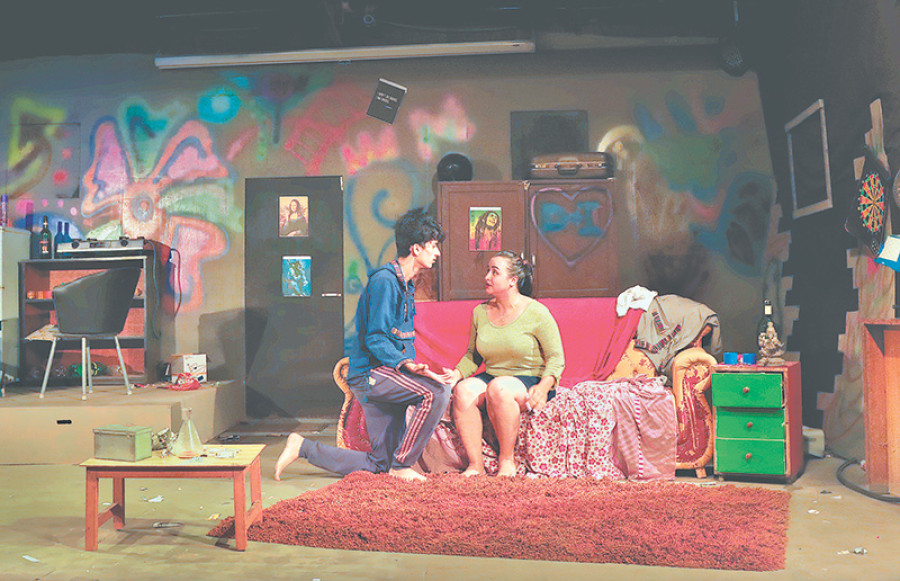Miscellaneous
The path well-trodden
What is theatre’s role in society?” asks Sandeep Shrestha in the playbill of his new play Basudev, currently on stage at Kunja Theatre. His question echoes the sentiment found in most other playbills that are handed out before the show. Often implicit in such a line of questioning is the belief that theatre is supposed to make a valuable contribution to society. Are such questions mere rhetorical ploys? Can theatre truly contribute in society building?
Sandesh Ghimire
What is theatre’s role in society?” asks Sandeep Shrestha in the playbill of his new play Basudev, currently on stage at Kunja Theatre. His question echoes the sentiment found in most other playbills that are handed out before the show. Often implicit in such a line of questioning is the belief that theatre is supposed to make a valuable contribution to society. Are such questions mere rhetorical ploys? Can theatre truly contribute in society building?
With these questions in mind, Basudev provides an interesting opportunity to explore why theatre has seemingly not been able to generate enough interest in Kathmandu. There is no interest in theatre “amongst the conspicuously consuming class,” Shubhanga Pandey wrote in 2015, “[Theatre] is a scene that is still marginal in scale and naturally, the audience is mostly made up of insiders.” Can Basudev provide us with a clue with as to why theatre still remains a marginal cultural activity?
The play takes place in Dev’s apartment. Dev, who is an addict, is lost in a cocaine-induced reverie when he is disturbed by his friend, Basu, who has arrived after stealing Rs 2,000,000 from his father. For next half hour, they bicker about the various ways in which they could use the money. Throughout this process, the audience learns new details about their lives: of Dev’s oscillating relationship with his girlfriend, of Basu’s murdered sister, and their general amnesia about anything else other than sex or drugs.
Basudev has been advertised as a play about drugs and sex. So it is fitting that the protagonists are overly indulgent in those two things, but this preoccupation enables nothing more than an allowance for a stereotypical caricature of people who do drugs. Nor does the two million rupees ever play a significant part, despite its repeated mention throughout the play. Instead, the audience sits through slapstick humour and forcefully injected sweeping statements about life.
Senseless humour and overt philosophising are the basic ingredients for any bad play. But Basudev has something even more problematic. In the second half hour of the play, Dev and his girlfriend go to buy drugs. Basu is at the apartment alone, waiting for his long time love interest to arrive. As soon as Eshika arrives, Basu immediately gropes her. Eshika is fearful of Basu and tries to maintain distance. Basu assures her that everything is cool and the stage is suddenly set with mist and music for them to fall in love.
How many times have we seen this tired leap of logic? How many times in a Bollywood movie has the stalker claimed the woman’s love? If a play cannot do something new, at least it should not reproduce something hackneyed.
If theatre has a sacred duty to society then that should be its ability to scrutinise itself. Basudev fails to meaningfully engage with its audience, but that is besides the point here. The craft of storytelling is perfected over time, but sensitivity and dedication to an issue has to be nurtured from the very beginning.
Sandeep Shrestha’s acting stands out in his play but his writing is yet another display of something endemic to Kathmandu’s theatre circuit. Most contemporary theatre presents a narrow imagination of our society. Consequently, plays have only been able to provide forgettable entertainment.
Theatre houses have mushroomed in the Capital and there is a play on stage almost every week. Why is it that all the critically and commercially successful productions are adaptations of foreign work? Previously, Sandeep directed an adaption of an English novel, Atonement, and acted in the adaptation of Three Sisters, a classic Russian play—both were critical and commercial successes. But why has there not been a marked improvement in original productions? Witch, staged at Sarwanam Theatre in February, was the last original production that had a lasting impact on me. Since then, Mandala Theatre has put out maybe three original productions but those have already been forgotten. It is also worth pointing out in general that there is a dearth of original productions in the city.
In this desert, the staging of something novel is an admirable achievement. So writer, director and actor Sandeep Shrestha deserves congratulations. But the sins he has committed while writing this play cannot be washed away. His characters—especially the females—are stereotyped caricatures. The story, too, one related to drug abuse, should have received more serious consideration. Without self awareness and a willingness to progressively explore the medium, theatre will be reduced to navel gazing.
Unable to suffer through the play, I walked out. Outside the theatre house, I encountered Gunjan Dixit and Akanchha Karki, two theatre artists who, it turns out, had walked out only a few minutes earlier. We all cringed collectively.
“Stereotypes should not be propagated in the name of experimentation,” Gunjan said. “Nepali theatre desperately needs constructive criticism.”
@nepalichimney




 22.37°C Kathmandu
22.37°C Kathmandu










